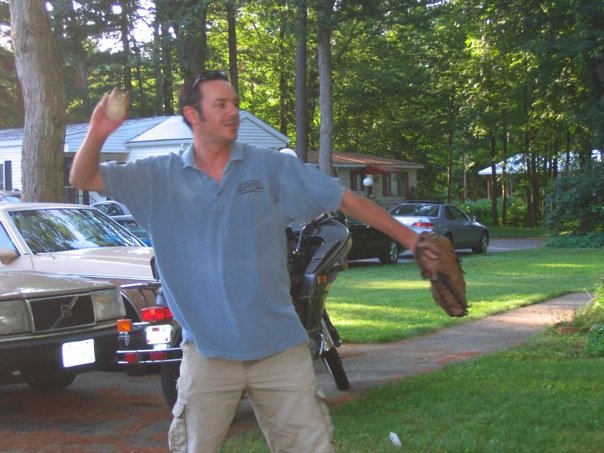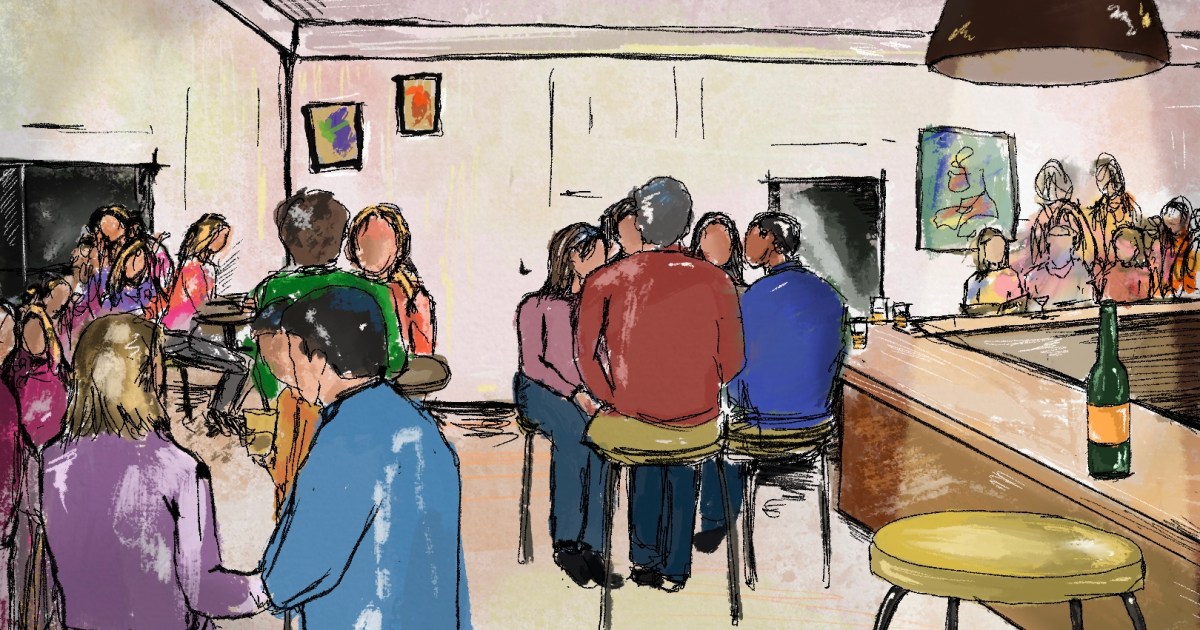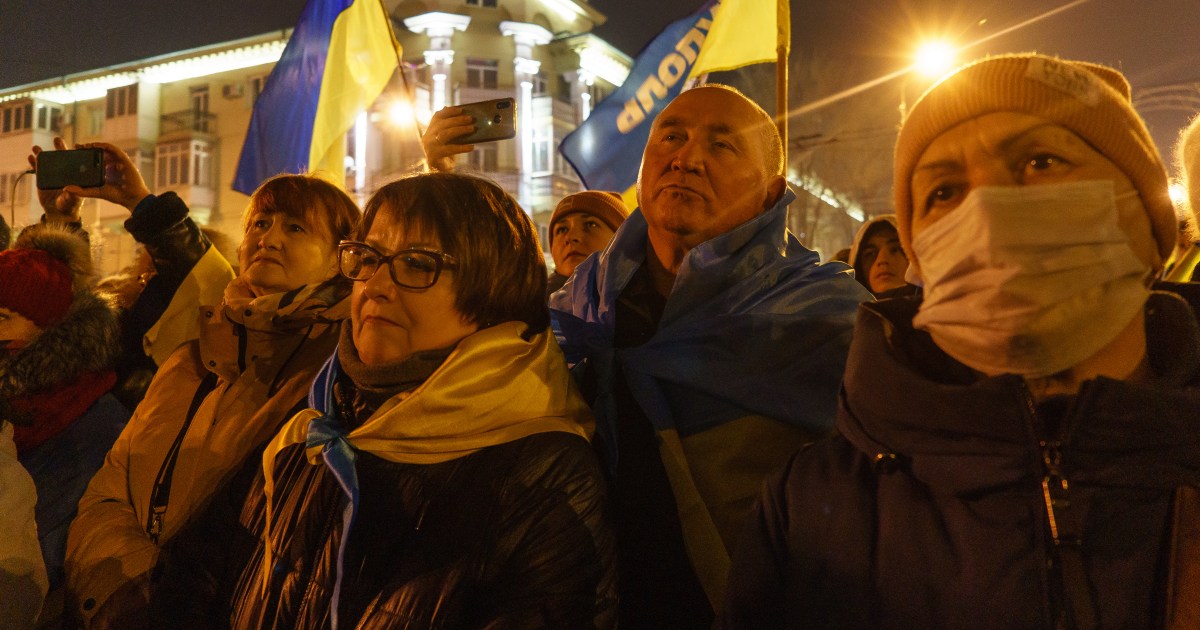How we remember them: The friend who died too young
In the past two years of the COVID-19 pandemic, loss has been part of the lives of millions. In “How we remember them”, we reflect on how we process that loss and the things – both tangible and intangible – that remind us of those we have lost.
In restaurants, we say “in the weeds”. Being in the weeds feels like drowning. One table needs water. Another stares into space, menus closed; they have been waiting to order, but every time you try to get to their table, another crisis emerges. Getting to them feels like moving through maple syrup.
They say restaurants are fast-paced, but ask anyone who has ever been in the weeds and they will tell you: during a moment when everything is crashing down, five minutes feels like five hours. One complaint feels like one million daggers. A small mistake can have many, many, many repercussions.
I mention this here because, after college, I became a waitress. I had no training. I actually had no business being a waitress. In college, at Columbia University, I was, first, a major in English and comparative literature, and, second, an intern at a few literary magazines. In high school, I had worked retail, at my Massachusetts hometown’s Hallmark, but I had never learned how to open a bottle of wine or cash out a cheque properly on a point-of-sale system.
Then, during my senior year, two planes crashed into the twin towers, and I slogged through the final days of college and came back home. I was going to go to law school, but that did not happen. I was going to be a writer, maybe, but I did not know what story to tell.
Instead, I got a job at a restaurant in my hometown that needed warm bodies to help feed tourists overlooking the waterfront on hot summer nights. It was a busy restaurant with a crooked set of operators, and, as summer bled into fall, my paycheques began to bounce. Then, one October morning, I arrived to find padlocks on the door. My job had suddenly ended.
The Grog
October is a lively time in New England. On weekends, there is leaf-peeping and football. It must have been busy enough for the Grog to need a backup waitress, whatever my paltry qualifications.
I am not sure how I convinced Bill to hire me. I had just turned 22, and I was still deciding what to do with my life. It was a gap year, I had decided. I was going to go back to school – grad school – but I was not sure where, or when, or for what. In the meantime, I had staked out a reasonably nice arrangement at my mother’s house. I could stay for one year, she said, as long as I held down a job.
Bill was four years my senior, a tall, lanky, and serious guy dressed in all black. Later, I would come to learn that he had arrived in Massachusetts by way of Sacramento. If you knew him, you might find it hard to believe that this New Englander – this die-hard Bruins fan – ever came from another state. He hired me on the spot, and I started training the next day.
The Grog is a tavern, with a restaurant on the main floor, a second-floor bar, a private dining space on the third floor, and a music venue in the basement. To work there is to learn to navigate space. I could never figure out quite how Bill did this. He was everywhere and nowhere, appearing exactly when you needed him and then disappearing into the ether. It was easy to be in the weeds at the Grog, but Bill was always there to diffuse the crisis.

One night, during the American League Championship Series between the Boston Red Sox and the New York Yankees, the manager on duty told the staff that we could wear our hats to work. He meant Red Sox hats, but I proudly wore a Yankees hat because I liked to push buttons.
It was a Saturday night in October, and the restaurant was full, and it was very busy, and the manager told me to take the hat off.
“Take the hat off or I’ll punch it off your face,” he said.
I thought he was joking, but he swung around to knock the rim up and accidentally clocked me in the nose, which immediately started to bleed.
Bill took me off the floor, grabbed a chair, and sat me down outside of the kitchen.
“I think my nose is broken,” I said.
“Your nose isn’t broken,” the other manager said.
I took my hand away from my face. Everyone looked at me in horror. My nose was definitely broken.
Bill, ever nonplussed, grabbed a waitress from the music venue downstairs.
“Drive her to the hospital, please,” he said. I still had a billfold in my pocket, with no less than $5,000 cash on hand. He did not care. He knew I was good for it.
Two hours later, I was back in the restaurant, fully bandaged. Bill handed me a cold beer. “Ready to cash out?” he asked.
We went on with the night.
My friend Bill
In restaurants, colleagues quickly become friends, and Bill became mine. I often think, now, with the benefit of time, that I took his friendship for granted. I worked at the Grog full-time for a year and then part-time for another year after I got into a grad programme in Boston. On the weekends, I would drive up from the city, work a shift, and park myself at the bar. By then, the Grog had become more than just a place of employment; it had become a home away from home.
When I think back on it, I spent much less time actually working there than I did living in the spaces of the restaurant, and that is where Bill and I became actual friends. He was no longer my boss, and I was no longer his employee. He was smart, and sarcastic. His humour was bone-dry. He was kind. He would do anything for his friends.
We had the kind of relationship that spanned distance. “We’ll catch up when you’re home” might as well have been our refrain, because he said it to me again and again, and I promised to call, again and again, and then life got in the way: first a busy series of jobs, then a relationship, a house, kids. We were always planning to hang out. We were going to get together: me and my husband with his wife and the kids. We were going to have a pool party. Why hadn’t we just done it?

In May of last year, a bartender who had worked at the Grog for more than 15 years died of cancer. She was just 60. During the years that I returned to my former place of business to visit, she was the familiar face who served up my cold Bud Lights (straight from the bottle, no glass).
I learned of her death in the Daily News, my hometown’s newspaper, and Bill was the first person I thought to text. He had just returned from the wake. He asked how I was, and how my family was. We were both recently vaccinated and the world looked bright, from the vantage point of people who were just emerging from the pandemic (or so we thought, at the time).
“We definitely need to hang out when you’re up here,” he said.
I told him I’d be up in July.
“Sounds great,” he wrote back. “Can’t wait to see you guys.”
I did come home in July, for nine days. My husband stayed back in New York, to work, and so I was solo, with two kids, then both less than five. I remember thinking that I should call him. I drove by the Grog, but I was not eating at indoor restaurants – not with two unvaccinated children – and the Grog did not have outdoor seating. I remember thinking: “Why don’t you just pick up the phone?” And I remember thinking: “It’s fine; there’s always next time. It’s so hectic, but next time, there will be more time.”
I left Massachusetts on August 1, and 20 days later, my friend Bill died of cancer. He was 45 years old.
‘Our Bill’
Bill and I had not lived in the same state for 16 years. That feels like a criminally long time, a reality made starker by the fact that I am now relocating to Massachusetts. I have all the time in the world now, old friend, but you are no longer here.
In October, right around my youngest son’s third birthday, Bill’s wife organised a celebration of his life at the Grog, but I was not able to go, so I followed the vigil from afar. I imagined what my friend would have thought about it all. He was, at the end of the day, a modest guy. He preferred to help from the back. He rarely put himself in the centre of anything. Maybe that is why few knew he was sick. Maybe that is why everything happened so quickly.
I have lost many friends. I have lost a father and all of my grandparents, several cousins. When you creep into middle age, the people who you loved and lost start to line up like dominos. And yet, I cannot shake the feeling of unfairness that washed over me – that still washes over me – when I think of Bill.
When I texted a friend to let her know of his passing, she simply wrote, “Our Bill? It must be another Bill.” That’s the way I suppose we all feel, no matter how much time and distance has passed: the sheer impossibility of it, that the Grog could ever exist without him (even though, to hear the old-timers tell it, the restaurant surely has); that there would ever be a time or place where he would not exist.
There is no good way to eulogise a friendship of 19 years. The best thing I can say is that I did too little and he did too much. Looking through photos, I was delighted to find one of my Baby in a Bruins Onesie that Bill and his wife had sent when my son was born. They had not been able to come to my combined baby shower-wedding – another one of those “next time” moments of ours – but they had sent a gift, and when my infant son finally grew large enough to fit into it, I put him on the floor of the nursery and snapped a picture to send to him.
I did send that picture, one of the things that I do not regret about the past couple of years. I wonder, now, if I will ever sidle up to the bar at the Grog again, a place that felt like home for so many years, mostly because Bill made it feel that way for me. I suspect many others feel this way about him, too: that walking into the restaurant felt like home, again and again, because of a single person’s effect. “Our Bill”, my friend said, and she was right. That loss feels big enough to be shared.




